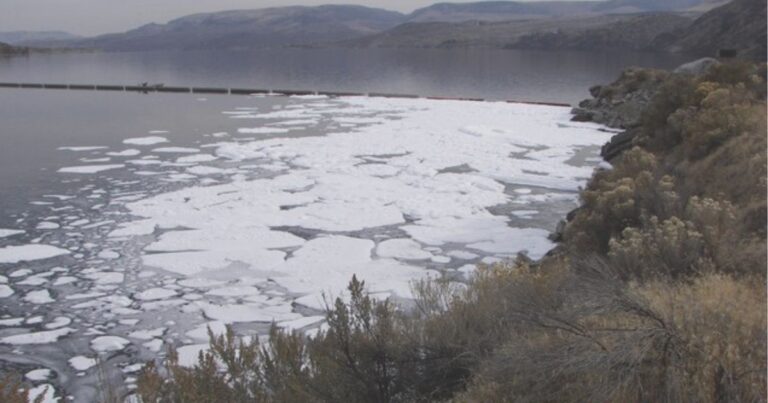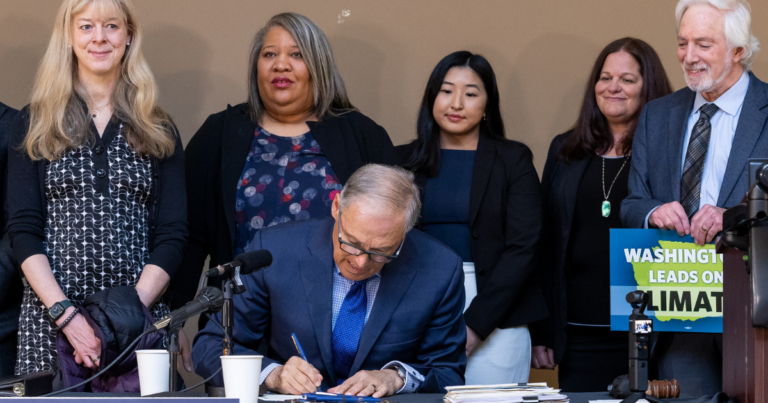Washington: ban toxic PFAS!
The Problem
PFAS are highly persistent toxic chemicals used in many products we come into contact with every day, from cleaning products and clothing to cookware. These chemicals cause a trail of pollution from manufacturing and use to disposal that Toxic-Free Future has documented in numerous studies.
Washington state is facing significant PFAS contamination problems and rising costs.
- Drinking water has been contaminated in communities from Whidbey and San Juan Islands to Selah (Yakima) and Spokane.
- A peer-reviewed study of 50 Washington moms found PFAS in 100 percent of breast milk samples.
- To address drinking water contamination, Washington has spent or allocated more than $71 million.
Washington state has been a leader in the nation as the first to ban the entire class of PFAS in food packaging and firefighting foam.
It has also taken numerous actions to address contamination and limit PFAS in drinking water. More recently, in 2023 Washington banned PFAS in indoor textiles and stain and water treatments. The state and King County have also brought lawsuits on the major polluters of PFAS in our state.
We need urgent action to end remaining uses of PFAS, clean up contamination, and hold polluters accountable.
The Solution
Washington state should address contamination and prevent PFAS from continuing to flow into our homes, workplaces, and schools, by maximizing its use of Safer Products for Washington. This groundbreaking law has the approach we want to see replicated at all levels of government and by companies. It requires transparency, banning the bad chemicals, and identifying the safest options.
The state needs to take aggressive action in three areas:
1. Prevention
The state should use all of its tools to end the use of PFAS in products, including using Safer Products for Washington and providing resources for companies and other entities (e.g. the fire service) to take back PFAS-laden products and help the transition to safer solutions.
2. Testing and Identification of Sources
The state should be aggressively testing drinking water (private wells and public systems) as well as groundwater to identify and mitigate contamination. Fire station drinking water wells should be a priority due to use of PFAS foams. Groundwater and drinking water should be tested near sites where there is potential for contamination, such as landfills, refineries, chemical plants, fire stations and training areas, and industrial users of PFAS such as chrome platers.
3. Cleanup and Holding Polluters Accountable
The state should do everything it can to identify PFAS contamination and hold polluters accountable, especially the military, which has been refusing to meet Washington’s drinking water standards in communities affected by military pollution.
The Washington State Department of Ecology has the opportunity and authority to ban toxic PFAS in ALL products through the Safer Products for Washington Act. The Washington Legislature created an aggressive 2025 timeline for this to happen.
We need your support to ban PFAS and ensure the legislature allocates funding to solve this devastating problem.
Current activities
- In March 2024, Toxic-Free Future and partners sent a letter to the Department of Ecology, urging the agency to put forward a strong and strategic plan for solving the PFAS in drinking water crisis facing Washington state.
- In January 2024, Toxic-Free Future submitted comments on the Cycle 1.5 Draft Regulatory Determinations Report, supporting the determinations to restrict PFAS. TFF also urged Ecology to fully use its authority to call in information on alternatives to PFAS in other product categories. This would enable the department to identify safer alternatives for these categories and propose additional PFAS restrictions.
- In December 2023, the Department of Ecology published the Cycle 1.5 Draft Regulatory Determinations Report, which recommended bans on PFAS in most apparel, cleaning products, and automotive washes. It also proposed reporting requirements of PFAS in multiple product categories, including extended wear apparel, firefighter personal protective equipment (PPE), floor and ski waxes, shoes, gear, hard-surface sealants, and cookware.
- As a result of a Toxic-Free Future petition, new drinking water testing requirements are being phased in under new rules adopted by the Department of Health, and more sites have been found where PFAS contaminates drinking water.
- The Department of Ecology (Ecology) put bans in place on indoor textiles and stain and water treatments after finding safer alternatives.
- By December 2023, Ecology will issue a draft report to the legislature on its search for safer alternatives in products ranging from firefighter turnout gear to apparel and food pans. Ecology has not yet evaluated alternatives to food pans, even though there are clear safer alternatives such as stainless steel and cast iron.
- Ecology is working on a long-term funding plan for addressing PFAS in the state as part of a request from the legislature that is due in the 2025 legislation session. Funding is critically needed now for PFAS testing, product replacement, and drinking water mitigation.










